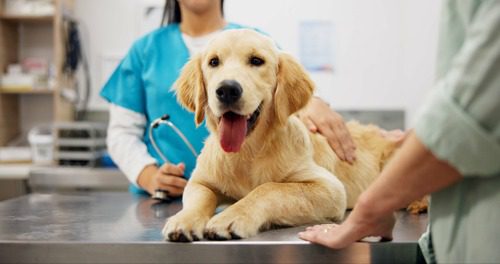Importance of Routine Wellness Exams for Pets
Pets thrive when they receive consistent, preventive care. One of the most important things you can do as a pet owner is schedule routine wellness exams with your veterinarian. These visits are more than a quick once-over. They help detect early signs of illness, track long-term health changes, and give you the opportunity to ask questions about your pet’s behavior, diet, and habits. In this blog, we’ll take a closer look at the importance of routine wellness exams for pets, what these visits typically include, and how they benefit both pets and their people. If you’re in the Parrish, FL area, call Parrish Veterinary Clinic & Urgent Care at (941) 216-2335 today to schedule your pet’s next wellness exam.

What Are Routine Wellness Exams?
Routine wellness exams are preventive veterinary visits that assess your pet’s overall health and development. Unlike appointments scheduled to address a specific issue, wellness visits are proactive, even when your pet seems perfectly healthy. During these exams, your veterinarian checks for any early signs of disease and monitors ongoing health metrics such as weight, heart rate, and dental condition. These visits are usually recommended once or twice a year, depending on your pet’s age, species, and health history.
Young pets and senior animals may require more frequent check-ins due to developmental changes or age-related conditions. By focusing on prevention, these exams help avoid more complex health issues in the future. The importance of routine wellness exams for pets becomes especially clear when a subtle symptom, easily missed at home, leads to early diagnosis and timely care.
What Happens During a Routine Wellness Exam?
A wellness exam is a structured assessment of your pet’s health. While each clinic may tailor the visit slightly, the core components are usually the same.
Physical Examination
Your veterinarian will perform a nose-to-tail physical exam. This includes checking your pet’s:
- Eyes, ears, and mouth for signs of infection or abnormality
- Skin and coat for lumps, parasites, or hair loss
- Heart and lungs using a stethoscope
- Abdomen to feel for any internal irregularities
- Muscle tone, body condition, and joint mobility
These physical assessments provide valuable information about your pet’s internal and external health. Even minor changes in appearance or posture can offer insight into underlying issues.
Vaccination Review and Updates
Another key part of a wellness visit is reviewing your pet’s vaccination history. Your veterinarian will recommend core and lifestyle-specific vaccines based on your pet’s age, exposure risk, and local disease threats. Staying up to date on vaccines helps prevent many contagious and potentially serious illnesses.
Diagnostic Screenings
Many veterinarians recommend annual or semiannual diagnostic tests, especially for senior pets. These can include:
- Bloodwork to monitor organ function and detect early disease
- Urinalysis to assess kidney and bladder health
- Fecal exams to check for intestinal parasites
Diagnostic screenings are a vital reason behind the importance of routine wellness exams for pets. They give your veterinarian a clear picture of internal health that may not be visible during a physical exam.
Weight and Nutrition Evaluation
Your pet’s weight directly affects their health. Weight gain or loss can indicate metabolic issues, chronic illness, or poor nutrition. During a wellness exam, your veterinarian will measure your pet’s weight, assess their body condition score, and make dietary recommendations as needed.
Why Early Detection Matters
Catching a health issue early can drastically change the outcome for your pet. Many common diseases including diabetes, arthritis, kidney disease, and cancer progress silently at first. A wellness exam can uncover small, early warning signs before symptoms become obvious.
Chronic Disease Management
If your pet already has a chronic condition, regular wellness exams allow for ongoing monitoring and adjustments. Blood pressure checks, medication reviews, and lab work ensure that your pet’s treatment plan stays on track. The earlier a condition is diagnosed and managed, the more likely it is that your pet can maintain a good quality of life.
Avoiding Emergency Situations
Routine exams can help prevent emergencies. For example, detecting a heart murmur before it leads to cardiac distress, or noticing dental decay before it turns into a painful abscess. Prevention not only protects your pet, it often lowers long-term veterinary costs as well.
Wellness Exams at Different Life Stages
Your pet’s needs change with age, and wellness exams adapt to those changes. Understanding the importance of routine wellness exams for pets means considering how care evolves from puppyhood or kittenhood through the senior years.
Puppies and Kittens
Young pets require multiple exams during their first year. These visits allow your veterinarian to monitor growth, administer a vaccination schedule, deworm, and provide microchipping. It’s also the ideal time to ask questions about training, nutrition, spaying/neutering, and socialization.
Adult Pets
From age 1 to about 7, most dogs and cats benefit from annual wellness exams. These visits help track weight, prevent dental disease, and keep vaccinations up to date. Routine bloodwork every year or two is typically recommended to establish a healthy baseline.
Senior Pets
As pets age, wellness exams become even more important. Senior pets may require exams every six months, along with regular lab work to monitor organ function and detect signs of arthritis, cognitive decline, or other age-related issues. Your veterinarian will work with you to adjust care as your pet’s needs evolve.
How Routine Wellness Exams Strengthen the Human-Animal Bond
Beyond the medical benefits, wellness exams create opportunities to strengthen your relationship with your pet and your veterinarian. These visits open the door to discussions about behavior, nutrition, exercise, and lifestyle, all of which impact your pet’s comfort and happiness.
Building a long-term relationship with your veterinarian also means they get to know your pet’s personality and health history. This context allows for more personalized care over time. When your pet sees the same vet regularly, it reduces stress and makes future visits more comfortable.
Making Preventive Care a Priority
The importance of routine wellness exams for pets is clear when you consider the health, longevity, and comfort they help provide. Regular checkups serve as a preventive measure, a health monitoring tool, and a resource for informed decision-making. Pets can’t tell you when something feels off, which is why consistent veterinary care matters. If your pet is due for a checkup, call Parrish Veterinary Clinic & Urgent Care at (941) 216-2335 or request an appointment online. Wellness exams are one of the most effective ways to support your pet’s long-term health and happiness starting today.
